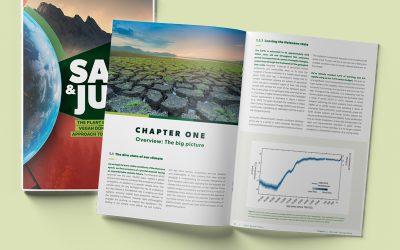Blog
5 health benefits of eating plant-based
April 4, 2022
Plant-based foods have come a long way. These days you can find a vegan substitute for just about anything. There is cashew and coconut cheese to replace dairy cheese; over a dozen vegan milks to replace cow’s milk; and for every chicken nugget, burger, bacon strip, deli slice or hot dog, there is a vegan alternative. Cauliflower, eggplant, portobello mushrooms and jackfruit are excellent healthy ways to sub out meat in your favorite dish. When you follow a plant-based diet it means all your food comes from plants, however that does not mean everything from plants is healthy once it’s been processed. So, while that vegan decadent chocolate cream donut with extra sprinkles contains no animal products, it’s best to enjoy in moderation if made with refined sugars, white flour and other processed ingredients. Therefore, this article focuses on the health benefits of eating a mainly whole foods plant-based diet and references doctors and organizations that advocate for a healthy lifestyle.
1. Supports a healthy body weight

A plant-based diet is a definite win for your health. If you are trying to reach certain weight goals or maintain a healthy body weight, then eating veggies, fruits, grains, and legumes high in fibre will help fill you up and provide important nutrients our bodies need.
Physicians Committee for Responsible Medicine has a Healthy Weight Loss fact sheet to download and use as a guide to get started. To keep you motivated, print it off and stick it to your fridge and use the information to help make a fun and wholesome grocery list. The guide provides tips for each meal and includes healthy snack and dessert options for those sugar cravings.
To maintain a healthy body weight, the guide specifically mentions avoiding the following;
“Meats, poultry, fish, eggs (both whites and yolks), and all dairy products (regular and nonfat), including milk, yogurt, cheese, ice cream, cream, sour cream, and butter.”
The Physicians Committee website provides weight loss meal suggestions and includes a huge database of delicious recipes to help you on your plant-based journey towards a healthy weight. President of the Physicians Committee, Dr. Neal Barnard, leads programs advocating for preventive medicine, good nutrition, and is a supporter of the Plant Based Treaty.
“A shift to a plant-based diet is beneficial in every way: for health, for the ethical treatment of animals, and for planetary survival.” – Dr. Neal D. Barnard
2. Helps prevent type two diabetes (as well as manage or reverse it)

People around the world have reversed type two diabetes by switching to a whole-foods plant-based diet. Perhaps you have read about these incredible and inspiring success stories from the people themselves in their before and after social media posts when they share before and after photos and explain how much better they feel after eliminating meat and dairy. Many people are even able to get off their diabetes medications. Medical studies such as this one on PubMed,“strongly support the role of plant-based diets, and components of plant-based diets, in reducing the risk of type 2 diabetes.”
Dr. T. Colin Campbell, author of the China Study and one of the doctors that plays a key role in the life changing documentary Forks Over Knives, advocates for a whole foods plant-based diet for multiple health benefits, including preventing diabetes.
“Whole grains, fruits, vegetables, and overall plant-based eating patterns may help prevent Type 2 diabetes and improve outcomes for people who already have diabetes.” – Forks Over Knives
To read more about the link between diabetes and diet click here.
Tip: If you are looking to experiment with whole grains, consider brown rice, millet, bulgur, barley, oatmeal and buckwheat. When buying bread check the nutrition information and look for the word “whole” on the bag.
3. It is heart-healthy

Eating plant-based foods is good for your heart. Cardiovascular disease is a major cause of death in Canada, the United States, and around the world. But it doesn’t have to be this way.
“Plant-based diets benefit heart health because they contain no dietary cholesterol, very little saturated fat, and abundant fiber. Meat, cheese, and eggs, on the other hand, are packed with cholesterol and saturated fat, which cause plaque buildup in the arteries, eventually leading to heart disease.” – Physicians Committee for Responsible Medicine
They also explain that switching to a plant-based diet can help improve several risk factors for heart disease such as high blood pressure, high cholesterol, inflammation, and atherosclerosis – a buildup of plaque in the arteries that restricts blood flow. A heart attack survivor tells his story in this blog post about how he turned his health around by following a plant-based diet and now teaches others about the benefits.
4. Improves energy levels

A plant-based diet can improve energy levels because eating nutritious food keeps you rejuvenated all day. It also aids digestion and helps with a healthy intestinal microbiome because the fiber in plant sources promotes the growth of friendly gut bacteria found in our digestive tract. These healthy high fiber foods help improve immune function, reduce inflammation, and may help regulate your mood.
Looking for an afternoon energy boosting snack to help get you through until dinner? Try these delicious and nutritious ideas and avoid processed snacks when possible.
· Trail mix with nuts and seeds (try adding goji berries and dried fruit for an extra boost)
· Fruit such as bananas, apples (try dipping slices in nut butter), oranges, pineapples or dark berries and strawberries
· Colorful veggies and whole grain seed crackers or pita with hummus or iron rich bean dip
· Sweet potatoes
· Edamame
· Roasted chickpeas
· Your favorite plant-based smoothie
5. Maintain healthy bones

Not only is the dairy industry scary to mother cows and her babies, but it’s scary for our health. We have been told by the dairy industry for decades that we need cow’s milk for healthy bones, but many doctors agree and studies conclude that we actually do not need this to maintain healthy bones and all the calcium we need can be obtained from a plant-based diet.
“…research shows that dairy products have little or no benefit for bones. A 2005 review published in the journal Pediatrics showed that drinking milk does not improve bone strength in children. In a more recent study, researchers tracked the diets, exercise, and stress fracture rates of young girls for seven years and concluded that dairy products and calcium do not prevent stress fractures in adolescent girls.” – Physicians Committee for Responsible Medicine
Not only are dairy products unnecessary, they are actually harmful because they contribute cholesterol and saturated fat to our diet which can increase risks of heart disease and stroke. Dairy product consumption has also been linked to a higher risk of cancer.
In addition to the groundbreaking work Dr. T. Colin Campbell provided for the China Study, he also started the T. Colin Campbell Center for Nutrition Studies, a non-profit organization raising awareness on the impact food has on our health, the planet, and living in a more sustainable world. They also suggest avoiding dairy, which includes “yogurt, milk, cheese, butter, half and half, cream, [and] buttermilk.”
To learn more about how dairy protein causes cancer, Dr. Campbell provides an informative video and article here.
“I enthusiastically support the Plant-Based Treaty. Nutrition is critical to our health, but it affects more than individual people. Our food choices impact whole communities, countries, the lives of animals, and the health of our environment.”
– Dr. T. Colin Campbell
Bottom line? A plant-based diet is not only the best thing we can do for our health, but also the most compassionate choice we can make for animals and helps protect our earth for future generations.
Want to learn about the dairy industry beyond health? Check out 7 Reasons To Ditch Dairy.
Disclaimer: This blog article, its content and material are not a substitute for medical advice, diagnosis, or treatment.

Miriam Porter is an award-winning writer who writes about veganism, social justice issues, and eco-travel. Miriam currently lives in Toronto with her son Noah and many rescued furry friends. She is a passionate animal rights activist and speaks up for those whose voices cannot be heard.
More from the blog
6 Important Calls To Action From The Safe And Just Report – Part One
By Miriam Porter
Grow Your Own Kale And Spinach For Healthy Green Smoothies
By Miriam Porter
The Importance Of Exercise And Tips On Building Muscle
By Miriam Porter



